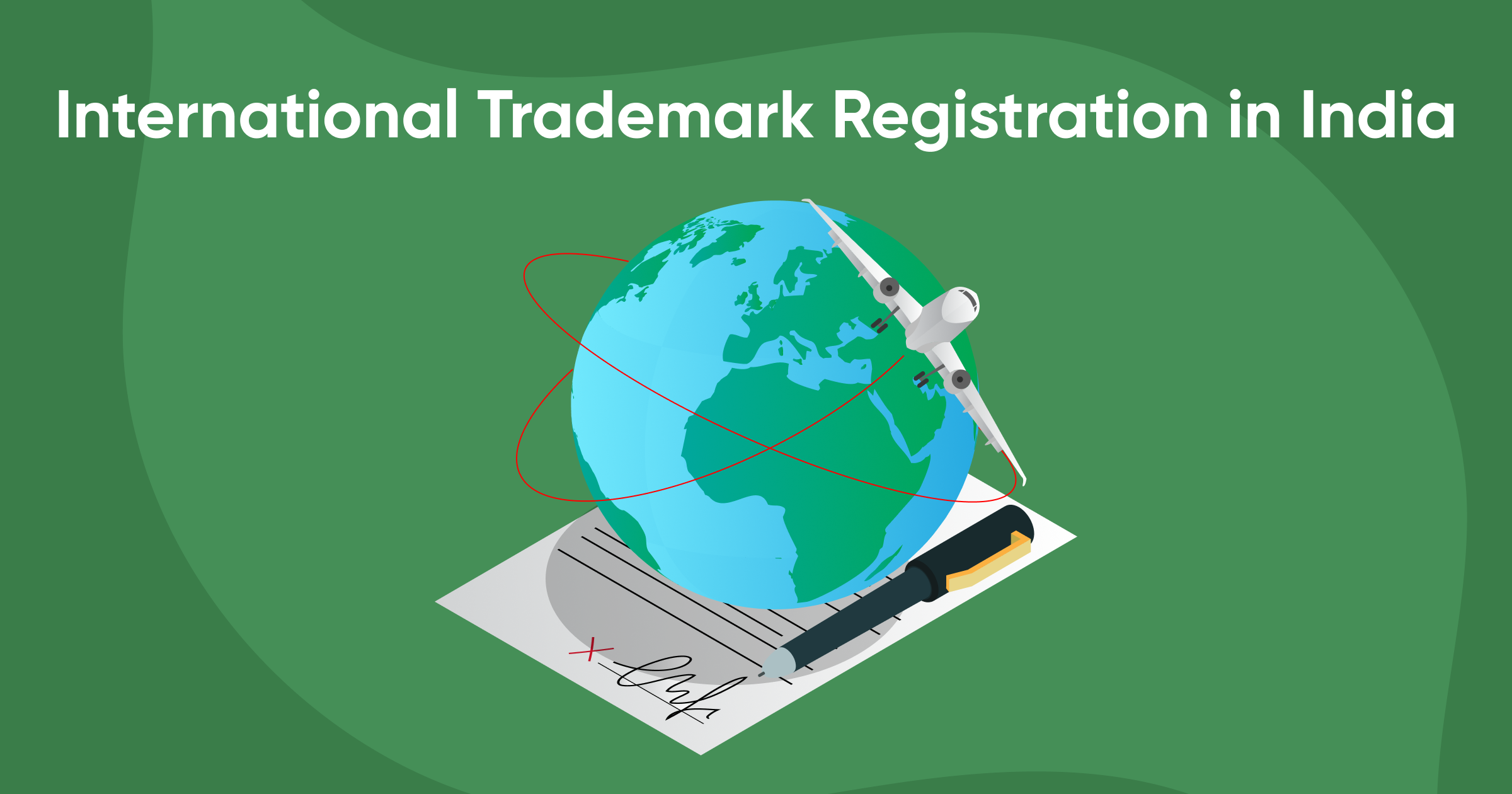In today's globalized world, protecting your brand across borders is crucial for business success. If you're planning to expand your business internationally or simply want to secure your brand in other countries, registering your trademark internationally is a must. This blog will guide you through the process of international trademark registration in India, explaining the steps involved, the benefits, and how Trademarkia can help you navigate this process smoothly.
Why Register Your Trademark Internationally?
Before diving into the process, let's understand why international trademark registration is essential:
- Brand Protection Across Borders: As businesses expand globally, protecting your brand in multiple countries ensures that no one else can use your trademarked name or logo, safeguarding your brand's identity.
- Legal Rights: Registering your trademark internationally provides you with legal rights to take action against unauthorized use of your brand in foreign markets.
- Market Expansion: A registered trademark can give you the confidence to enter new markets, knowing your brand is protected.
- Building Brand Reputation: A registered trademark in multiple countries enhances your brand's reputation, showing that you are serious about protecting your brand and offering your products or services globally.
Understanding International Trademark Registration in India
International trademark registration is not as daunting as it may seem, especially with the right guidance. In India, international trademark registration is facilitated under the Madrid Protocol, an international system that allows trademark owners to seek protection in multiple countries by filing a single application.
Common Challenges in International Trademark Registration
Registering a trademark internationally offers numerous benefits, but the process can be complex and challenging. Each country has its own set of rules, procedures, and potential pitfalls that can complicate the registration process. Below are some common challenges businesses face when registering their trademarks internationally and tips on how to overcome them.
1. Varying Legal Requirements Across Countries
One of the most significant challenges in international trademark registration is navigating the different legal requirements in each country. While the Madrid Protocol simplifies the process by allowing you to file a single application, each designated country still examines the application according to its own laws.
Tips to Overcome:
- Research the specific trademark laws in the countries where you seek protection. Understanding the local requirements can help you prepare your application accordingly.
- Consult with local trademark attorneys in each country to ensure your application meets all necessary criteria. Trademarkia can connect you with experienced attorneys who specialize in international trademark law.
2. Language Barriers
Trademark applications under the Madrid Protocol can be filed in one of three languages: English, French, or Spanish. However, if a country has specific language requirements, you may need to provide translations of your application, which can be time-consuming and costly.
Tips to Overcome:
- Use professional translation services to ensure that your application is accurately translated into the required languages.
- Work with a platform like Trademarkia, which offers support in managing translations and navigating language-specific challenges.
3. Potential Objections and Oppositions
After filing your international trademark application, each country where you seek protection will examine it independently. This process can lead to objections or oppositions if the local trademark office finds issues with your application, such as similarity to existing trademarks or non-compliance with local laws.
Tips to Overcome:
- Conduct thorough trademark searches before filing to identify any potential conflicts in the countries you’re targeting.
- Be prepared to respond to objections or oppositions by gathering evidence of your trademark’s distinctiveness or making necessary amendments to your application.
4. Managing Deadlines and Timelines
The timeline for processing international trademark registrations can vary significantly between countries. Some countries may complete the examination process within a few months, while others can take over a year. Keeping track of deadlines, such as those for responding to objections or renewing trademarks, is critical to maintaining your trademark rights.
Tips to Overcome:
- Use trademark management tools or services offered by platforms like Trademarkia to track deadlines and ensure timely responses.
- Set reminders for critical dates to avoid missing deadlines that could jeopardize your trademark registration.
5. Differences in Trademark Classification Systems
Countries may use different trademark classification systems, leading to discrepancies in how your trademark is classified. For instance, the Nice Classification system is widely used, but some countries may have additional local classifications or interpret the classes differently.
Tips to Overcome:
- Consult with local experts who understand the classification systems in each country.
- Review the classifications carefully when filing your application to ensure your goods or services are categorized correctly.
6. Costs and Budget Management
International trademark registration can be expensive, especially when you factor in filing fees, attorney fees, translation costs, and potential costs for addressing objections. Managing these expenses effectively is crucial for businesses, particularly small and medium-sized enterprises (SMEs).
Tips to Overcome:
- Plan your budget carefully, accounting for all potential costs, including those that may arise if objections are raised.
- Consider using a cost-effective platform like Trademarkia, which offers transparent pricing and helps you manage costs efficiently.
7. Enforcing Your Trademark Rights Internationally
Once your trademark is registered internationally, enforcing your rights in different countries can be challenging. Each country has its own enforcement mechanisms, and navigating these can be complex, especially if you encounter infringement.
Tips to Overcome:
- Familiarize yourself with the enforcement processes in each country where your trademark is registered.
- Work with local legal experts who can assist in enforcing your trademark rights and taking legal action against infringers.
What is the Madrid Protocol?
The Madrid Protocol is an international treaty that simplifies the process of registering trademarks in multiple jurisdictions. It allows trademark owners to file one application, in one language, and pay one set of fees to protect their mark in up to 124 countries, including India.
Steps to Register an International Trademark in India
Here’s a step-by-step guide to registering your trademark internationally from India:
- File a National Application: Before you can file an international trademark application under the Madrid Protocol, you must have a registered trademark or a pending application in India. This is known as the "basic application" or "basic registration."
- Submit an International Application: Once your basic application is filed, you can submit an international application through the Indian Trademark Office. The application will include a list of countries where you seek protection.
- Examination by WIPO: The World Intellectual Property Organization (WIPO) examines your application to ensure it meets all formal requirements. If everything is in order, WIPO will publish your trademark in the International Gazette and notify the trademark offices in the countries you've selected.
- Examination by Designated Countries: Each country where you've applied will examine your trademark according to their local laws. This process can take between 12 to 18 months. If any country raises objections, you'll need to address these within the stipulated time frame.
- Registration and Protection: Once the trademark is accepted in each of the designated countries, your trademark is registered and protected internationally. You can then enforce your trademark rights in those countries.
Trademarkia: Your Trusted Partner for International Trademark Registration
Navigating the complexities of international trademark registration can be challenging, but with the right support, it becomes much more manageable. This is where Trademarkia comes into play.
Trademarkia is a leading platform that simplifies the trademark registration process. Whether you’re looking to register a trademark in India or internationally, Trademarkia provides a comprehensive service that guides you through every step of the process. Here’s how Trademarkia can help:
- Expert Guidance: Trademarkia connects you with experienced trademark attorneys who understand the nuances of international trademark law and can provide expert advice tailored to your specific needs.
- Simplified Process: Trademarkia’s platform is user-friendly, making it easy to file your trademark applications, track progress, and manage your trademark portfolio from one place.
- Cost-Effective Solutions: Trademarkia offers transparent pricing with no hidden fees, ensuring that you know exactly what to expect in terms of costs. This is particularly beneficial for small businesses and startups looking to protect their brand without breaking the bank.
- Comprehensive Support: From filing the basic application in India to managing responses from foreign trademark offices, Trademarkia offers end-to-end support throughout the entire registration process
Conclusion
International trademark registration is a crucial step for businesses looking to expand their presence globally. By securing your trademark in multiple countries, you protect your brand, gain legal rights, and build a stronger reputation. With the help of the Madrid Protocol and a reliable partner like Trademarkia, the process of international trademark registration becomes straightforward and stress-free.
If you’re ready to take your brand global, start by registering your trademark internationally with Trademarkia. Their expert team and comprehensive services will ensure that your brand is protected across borders, giving you the confidence to grow you
Frequently Asked Questions
1. What is the Madrid Protocol, and how does it simplify international trademark registration?
The Madrid Protocol allows you to register your trademark in multiple countries with a single application, reducing paperwork and costs while streamlining the process.
2. Do I need to have a registered trademark in India before applying for international trademark registration?
Yes, you must have a registered trademark or a pending application in India before applying for international registration under the Madrid Protocol.
3. How long does the international trademark registration process take?
The process typically takes 12 to 18 months, depending on each country's examination timeline and whether there are any objections.
4. What happens if my international trademark application is rejected in one of the designated countries?
If rejected, you can contest the decision by responding to the objections. A rejection in one country doesn't affect your application in other countries.
5. How can Trademarkia help me with international trademark registration?
Trademarkia simplifies the process by offering expert guidance, managing the application, and ensuring compliance with each country's requirements.







